Episodes
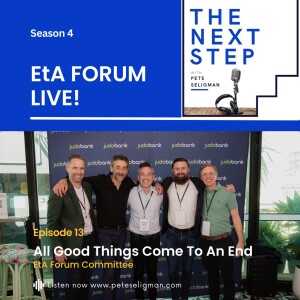
Friday Apr 14, 2023
Friday Apr 14, 2023
This episode of The Next Step – the final episode for the season – is a short bookend to wrap up the series, and we’ve included it in the interest of completeness. These are closing remarks after a wonderful and insightful EtA Forum.
As I mentioned, for the first effort at something of this scale for the EtA community, the turnout was truly incredible. Many more people came than was expected, and consequently, thanks to that support, not only was the atmosphere at the event as dynamic as it was, but the event was able to donate profits to several charities across Sydney.
The success of the event means that it will be back this year, so be sure to attend if you can! As you’ll hear here, not only is it an excellent event for sharing information, but you’ll enjoy plenty of networking opportunities at an after-party that will go late into the night.
It is our great privilege to be part of the local search community in Australia, and help connect and inform what will be a major path to entrepreneurship in the years ahead. Thanks for listening to this season of the podcast, and we look forward to being back with Season 5 soon.
Register for the 2023 EtA Forum: https://www.peteseligman.com.au/etaforum
Connect with Pete: https://www.linkedin.com/in/peteseligman/
What we discussed:
1:20 Pete begins his concluding remarks from the EtA Forum 2022.
2:04 Thanks to the sponsors and partners of the event.
3:58 Thanks to the support of the forum we were able to donate to several local charities.
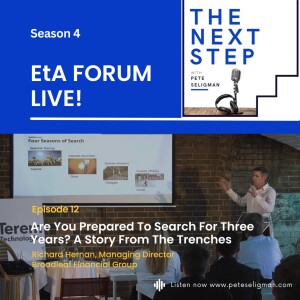
Friday Apr 14, 2023
Friday Apr 14, 2023
The final session of the inaugural EtA Forum was a hugely entertaining and insightful story about the searcher’s journey. Richard Hernan decided, at the age of 40, that it was “now or never” to follow his dream to become an entrepreneur and business owner. At the time he had 12 months’ worth of financial reserves, which he assumed would be ample to find and acquire a business.
Three years later he found himself in Centrelink for benefits, and still trying to finalise a deal. It was at that critical moment that it came together for him and the search was finally successful.
This is a story of discipline, confidence and belief, and really highlights the kind of resolve and determination that searchers sometimes need. The payoff, of course, is well worth it, as they can then follow through with their entrepreneurial ambitions. However, it is a process that requires a particular profile of a person to see it through to success.
Richard also shares his thoughts on the “four seasons” philosophy towards search, one that I love myself. It starts in Spring, when the entire process is exciting and the search is underway. Then it moves to Summer, when the acquisition is hot and the business growth and opportunity is dynamic. Then comes Autumn, which is the time for the searcher to start to ease back on their role within the business, before finishing with the exit in Winter. This “four seasons” approach is an excellent way to look at the journey of a searcher, and Richard’s own story is the perfect example of it.
For anyone looking to get into search, this is a must-listen presentation because it will help you to prepare for your own journey.
Connect with Richard Hernan - https://www.linkedin.com/in/richard-hernan-a655267b/?originalSubdomain=au
What we discussed:
2:26 Richard starts his presentation and introduces the “four seasons of search” concept.
5:25 Richard shares his backstory: how he got involved in Search and why he took that path.
10:52 The importance of self-awareness when starting the search journey.
12:37 Getting the search started – where searchers can start learning what they need to know.
17:07 The psychology of search – what can searchers do to help keep themselves grounded and positive?
20:27 Richard shares a story about the challenges he had getting a deal finalised even after it had been accepted by all parties.
22:40 Going from solo search to partner search, and the difference that made to the search effort.
23:50 Richard shares the story of when his financial reserves had just about run dry and he needed to seek assistance from Centrelink.
28:22 Having now acquired the company, what should your first priorities be?
29:20 The good and the bad – Richard highlights some of the most memorable experiences on both extremes from his search journey.
32:34 Richard shares an update on where Broadleaf stands now and its ongoing growth.
35:37 Richard finishes with closing thoughts – “was it worth it?”
Key quotes:
“I had a moment where I was sitting across the table having lunch with the CEO of the world's biggest or second biggest mining company. And I found myself thinking “I don't want to be you.” But then, when I reached out to entrepreneurs I realised that that's who I want to be – an entrepreneur who's in control of what they do.”
“At the start, in the Spring, what you want to do is leave your eyes open and your ears open, and really try and learn as much as you possibly can.”
“To quote Otto von Bismarck, “any fool can learn from experience, but the trick is to learn from other people's experience.” So what I tried to do, even before I jumped out of the corporate world, and then certainly after I jumped out of that was to say, “who's done this before? I'm not trying to do anything that hasn't been done before.” So I went and met with the three or four people in Perth, who had previously acquired a handful of businesses.”
“To achieve the aspiration I had about having an impact on a million lives, I knew I needed to acquire something of service. And so, while I looked at a lot of different businesses, I narrowed that down to service businesses.”
“I felt that with search, there's not much tangible progress that you can show. So, I feel that you need to have hobbies or different things that are going on in your life that give you that, that release and a sense of tangible progress. For me, I ran a couple of marathons.”
“I prided myself on being able to say “what's the time period between one deal falling over and the point where I fully focus on the next one,” and then build that muscle that would allow me to then get up and go again.”
“Along the way, I joined up with a co-founder who had deep experience in financial planning and financial services. So I went from that solo search to a partnered search, and that was game-changing for me thanks to his industry knowledge.”
“There wasn't a second where I thought, “oh, no, I’m done.” There was one day where I'd gone from a visit to Centrelink and having to spend $170 that I didn’t have to recover my car after having it wheel planted, to having lunch with the execs from Macquarie Bank and outlining for them that I need 50 million dollars for a planned acquisition.”
“The MBA book would tell you to get in there with your new business in the first 90 days and smash it out, and change everything. However, the search book says that for your first 90 days or the first six months, whatever it is, don't go and smash things. Try not to touch anything.”
“There are going to be surprises. People ask what you were most surprised by, and I always respond that I’ve never really been surprised by them. Because I'm putting myself in there thinking, “there's going to be a whole heap of stuff that I don't know about.” It’s also important to note that there are not just bad surprises, there are good surprises too.”
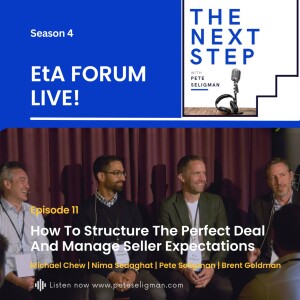
Thursday Mar 30, 2023
Thursday Mar 30, 2023
In this session of the inaugural EtA Forum, people from all ends of the search spectrum came together to discuss a vital, if sometimes prickly topic: how to structure the perfect deal, especially when the seller isn’t as experienced.
Often in search, the business owner is not an experienced business seller, and this can have implications in many ways. For example, they might be unaware of the critical information that the searcher will want to see in a due diligence process. Or, they may have unknowingly surrounded themselves with poor-quality advice, which can end up undermining the entire deal.
A searcher’s first job, after identifying a business that they like the look of, is trying to encourage the seller to have the best quality support and advice around them as possible. From there it will become more straightforward to negotiate and gain access to the information that they need to come to a conclusion.
Another major point that was brought up by the panel was the need to be flexible. Through any due diligence process, there is going to be information that comes to light that is unexpected. The experienced searcher, however, approaches this with the mindset that these are hurdles, not roadblocks. There is a solution in the deal and negotiation which means that neither party needs to walk away when the unexpected is found during due diligence.
For an awesome insight into the psychology of searchers and their relationship with sellers, this panel is a must-listen!
Connect with:
Michael Chew – Flywheel Effect https://www.linkedin.com/in/michael-chew-3028b61
Brent Goldman – Nexia Australia https://www.linkedin.com/in/brentgoldmanadviser/
Nima Sedaghat – HWL Ebsworth https://www.linkedin.com/in/nimasedaghat
Pete Seligman - https://www.linkedin.com/in/peteseligman/
What We Discussed:
2:44 What’s driving the headline information as a deal is being structured?
4:42 Why it is important that the vendor is getting good advice for a deal.
6:35 What are the challenges that come from unsophisticated sellers, and how do you manage those deals?
9:01 What’s the mindset of the inexperienced seller? Are they just looking for a cash price, or how else might they approach a deal?
12:33 Why it’s valuable to communicate how the deal will practically work for a seller, and building education into the process.
14:29 Why being flexible during the due diligence process is so critical.
16:34 For buyers, how does the due diligence process influence the structure of a deal?
20:40 Q & A with the audience.
26:31 Pete provides a summary and analysis of the panel’s key findings.
Quotes:
Michael Chew: “Something that I think is common with a lot of the deals of the size that that we have is that there are relationships and other things held in with the person how you mitigate that risk.
Pete Seligman: “You've got to know how the vendor on the other side of the deal is being advised and how capable the advice is. The better the advice that the vendor is being given, the better the process is going to be. You might go in there thinking “oh, they've got crap advice, and this is going to make it really easy for me to walk all over them.” But actually, it just makes it really, really hard to structure a deal.”
Brent Goldman: “A business that doesn’t have the right financial information doesn't actually mean that it’s badly run – it may well be making money and surviving comfortably. So I would see that as an opportunity to put in some processes and systems and really drive growth.”
Nima Sedaghat: (10:59): “As a buyer, it's a worthwhile exercise to ask your advisors “what does this deal structure that we're proposing look like for the seller?” If they're expecting just to take all the cash off the table, from day one, it's important to be able to articulate why that works for them, whether that’s because they’re managing the tax timing, or if it's likely that they can access exemptions, and so on.”
Pete Seligman: “Working capital is the most misunderstood kind of function, definitely in small businesses, but plenty of larger businesses too. It's the one that sellers always misinterpret with regards to the impact that it’s going to have on cash flow and what they’re selling.”
Nima Sedaghat “You just don't know what is going to be uncovered as part of your due diligence process. You could start a deal and get through commercial due diligence and you're on to a winner, but then your accountant gets in there and discovers that the quality of earnings is nowhere near what you thought. So, you're going back to the drawing board to manage that risk.”
Pete Seligman: “When you go skiing and you’re about to hop on the chairlift, you’re going to be thinking about all the runs that you’re going to do. This is like when you're just seeing a deal for the first time. You might think to yourself that you like the business, so you “get on the chairlift” and start doing due diligence. Then you get to the top of the hill, and you can actually see the business. You have completed commercial due diligence, and you understand the business. Then you need to move into the confirmatory stuff, which is the point where you start skiing down the hill and your options start to get fewer and fewer. That’s when you need to commit – and just like skiing, once you get started you can’t half commit to a run.”
Pete Seligman: “There's no doubt you'll find all sorts of stuff. It's about saying every single thing I'm going to find is going to be a hurdle, not a roadblock. I'm going to look for things that I can do with the deal or negotiation so I can continue moving forward because I am doing this deal.”
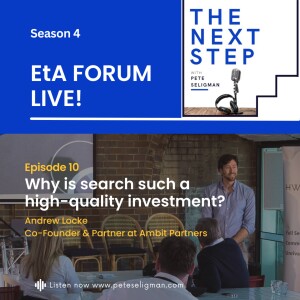
Thursday Mar 23, 2023
Thursday Mar 23, 2023
Andrew Locke’s Ambit Partners is one of the big global names in search. Based in South Africa, the company has invested in searches across the world, and in some interesting markets. From the mature and established markets of Western Europe and the US to fascinating emerging opportunities in places like Brazil and Cote d’Ivoire, Andrew and his people have deep insight into the true opportunity and value of search.
In the presentation that he made at the inaugural EtA Forum last year, Andrew provided some fascinating and valuable insights into why search is appealing from an investor’s perspective. He presented a compelling case for how search fits into the spectrum of returns and why it is a relatively low-risk opportunity for investors. Search, done well, provides the downside protection of private equity investment while also offering the upside that venture capital brings to the table.
It also provides strong returns. Currently, the profile for both searcher and the type of companies that they look to acquire means that search is relatively lucrative. Additionally, it allows for substantial portfolio divestment, given the individual nature of most searchers and the breadth of companies that can be acquired through them.
Andrew also ran an extended Q & A session at the end of his presentation, which provided us with some excellent insights into the kind of searcher that Ambit Partners invests in, as well as the appeal of supporting the first (or one of the first) searchers in any given market.
For anyone who is interested in understanding the kind of searcher and business that investors will find appealing, this is a must-listen.
Connect with Andrew: https://www.linkedin.com/in/andrewtlocke/
Connect with Pete: https://www.linkedin.com/in/peteseligman/
Join us at the next EtA Forum in September: https://www.peteseligman.com.au/etaforum
What we discussed
1:15 Pete introduces the topic, and speaker Andrew Locke from Ambit Partners.
2:25 Andrew introduces himself and the broad topic of “why invest, what causes returns, and how do we hold them up?”
3:48 How do search funds fit into the wider private equity and VC landscape?
5:58 How successful are search efforts? How many find acquisitions and how many of those have a positive return?
8:05 Why do searches so frequently show a positive return? Why do these returns happen?
12:22 Open Q & A with the audience.
12:52 Why Andrew and Ambit Partners like working in unusual markets.
14:38 Andrew talks about one of the search funds that failed in the US.
15:40 How Andrew and Ambit Partners do due diligence on searchers.
17:15 Andrew explains the mix of Ambit Partners’ portfolio.
18:28 On why Andrew is agnostic about the need to have an MBA to be a searcher.
20:15 Pete provides a summary and analysis of the presentation.
Quotes
“We see search funds filling a missing segment of the investment landscape for smaller businesses that have the maturity and the stability of traditional private equity. Because of this, the chance of investment going to zero is very low.”
“When we look for businesses, we want to see companies that are post-concept risk and have missed that concept chasm. In other words, we’re looking for businesses that have found product market fit and are on their way to scale.”
“About two-thirds will find an acquisition and one-third will fail to find an acquisition and close after their search for capital. We don't see that as a failure. In the sense, it's far better to do no deal than to do the wrong deal.”
“There’s a very compelling individual profile for a searcher and for investors in a single asset. But as these are combined in portfolios, the overall benefits of diversification are quite meaningful.”
“What we often see is people taking a hybrid or omnivore approach, where you invest in a fund to get that diversification of exposure to search. And then you take targeted co-investment opportunities with searchers that you think you can provide additional value to.”
“Part of the reason that we actually like supporting entrepreneurs to be the first or among the first in a new market is that it's very hard to do that. And the type of person that is able to and has the appetite to meet the requirements of the profile very well.”
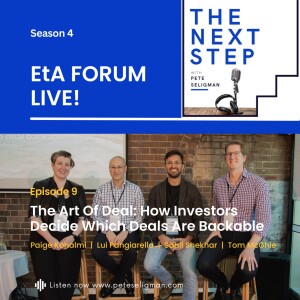
Thursday Mar 16, 2023
Thursday Mar 16, 2023
Getting to the core of what makes a deal backable is at the forefront of anyone who is involved in search. That was the subject of this panel at last year’s inaugural EtA Forum, which brought together four people involved in search in different ways to share their experiences.
The key theme driving the conversation is, as the moderator, Paige Kohalmi says, “the searcher plus a good opportunity, and the right funding structure, is what makes a deal backable.” These three elements are equally core, and any investor is going to consider those three things closely, giving them equal weighting, before supporting an acquisition.
One of the highlights from the panel was when the panellists discussed three different companies, in different sectors and with different profiles. They were asked to choose which of the three they liked most as a candidate for an investment. The fact that all three panellists chose a different first target just goes to highlight how subjective this process can be. Every investor and searcher is going to evaluate risk in a different way and, ultimately, come to a different conclusion.
That does drive home the importance of character in the searcher and who they’ve got backing them, too. The capabilities of the searcher and what they will bring to the business can go a long way to strengthening the numbers sitting behind the business.
The panel also covered a subject that is worth keeping in mind, that the downside with search is more protected than it would be with a VC or startup, because the business is already established and earning revenue. There’s no point in looking at a business that hasn’t proven this or hasn’t got strong recurring revenue (or there are clear risks to that revenue), and margins are a key data point that can make a business very attractive.
Overall, this is a fascinating panel for anyone who is interested in better understanding the thought processes that factor into deciding which searches to back.
Connect with Paige Kohalmi: https://www.linkedin.com/in/paige-kohalmi/
Connect with Sahil Shekhar: https://www.linkedin.com/in/sahil-shekhar/
Connect with Tom McGhie: https://www.linkedin.com/in/tommcghie/
Connect with Lui Pangiarella: https://www.linkedin.com/in/luipangiarella/
What we discussed:
1:25 Paige introduces the panel and topic for discussion.
2:45 Tom kicks off the discussion with his perspective of placing debt – what makes a deal backable?
4:50 Sahil describes his approach to identifying opportunity and how to find a deal to be involved with.
7:16 From the perspective of an investor, Lui discusses the importance of resilience.
10:43 “Simplicity” is a core concept with funding. Lui and the panel discuss what that word means to them.
12:42 The panel segues to discuss balancing the share of upsides. As someone who has been involved in both search and investment, Sahil shares his perspective.
16:57 Summarising the discussion to date, Paige says “the searcher plus a good opportunity, and the right funding structure, is what makes a deal bankable.” The next question is – is one of these elements more important?
18:26 The panel is presented with three companies, and asked to pick apart the opportunity of each.
25:44 An extended Q & A with the panel.
21:49 Pete provides a summary and analysis of the key findings from the panel.
Key quotes:
Tom: “The most important thing in deciding whether a deal is bankable from a debt perspective and where we should place that deadline is actually the searcher the people involved.”
Sahil: “Both as a searcher and as an investor, you're trying to protect the downside, and to reduce business risk. There is a bit of operator risk, because there’s a transition in owner operators, so what you're trying to really protect against is other downsides.”
Lui: “Recurring revenue is what we would put as our number one priority. If the business has got 90% recurring revenue, you know that you're going to survive next year. It's as simple as that. It's why project-based businesses don't work in search. Because if you don't replace the revenue that disappears, you've got a failure.”
Tom: “From a debt perspective, there is no transactional efficiency in adding mezzanine finance in a deal that might be four or five million dollars. Or even thinking that you're going to do that.”
Sahil: “There is more risk for an operator than they would be in a private equity environment.”
Sahil: “From the investor point of view, you want to know that the searcher is committed, and will stick through with a company and in hard times… there are some deals where searchers are putting on director guarantees, and underwriting debt themselves personally, or making other significant personal contributions. There are many ways to get comfort on how all-in the searcher is.”
Lui: “There is no scenario where the wrong searcher will actually give us the right opportunity and right structure.”
Tom: “There is absolutely no benefit to a debt provider to thinking through the future trajectory, in terms of the opportunity upside, if the business hasn't been proven today, or hasn't been performing to this point.”
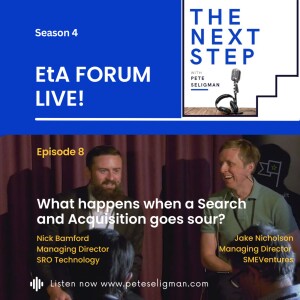
Thursday Mar 09, 2023
Thursday Mar 09, 2023
Sometimes a search goes wrong. It’ll start with a sense of unease, and only really become apparent after the acquisition, but it can be a stressful, morale-crushing experience when it happens. That’s the experience that Nick Bamford had at one point during his own search journey. That case study forms the basis of this important session of the inaugural EtA Forum.
Nick – who is now happily running SRO Technology, found himself in a situation with an (eventually) hostile seller and management issues across the board when he took over a business. Analysis and due diligence indicated that the acquisition was worth pursuing. However, when the seller embarked on an extended holiday immediately, Nick was forced to become far too active in the first hundred days, and it became rapidly apparent that there were cultural issues within the business.
Ultimately, Nick felt the situation was unsalvageable and decided to exit. Fortunately, the agreement protected him from liability. After a period of reflection, he was able to resume his search journey, eventually finding SRO Technology and now growing that company through acquisition.
It’s rare to get such an open and frank dialogue as you’ll hear in this session. Nick and SMEVentures’ Jake Nicholson had a free-flowing conversation that holds back nothing. Consequently, it’s essential, both in learning how to identify the red flags that a deal will be challenging, to highlighting the kind of change management mistakes that can occur early into an acquisition.
Connect with Jake Nicholson: https://www.linkedin.com/in/jakenicholson/
Connect with Nick Bamford: https://www.linkedin.com/in/njbamford/
What we discussed:
2:01 Jake and Nick kick off their conversation by discussing the big lessons learned from Nick’s search.
3:05 Nick summarises his pre-search background, and what inspired him to start his search.
5:13 Nick describes the company that he eventually found to make an offer on.
7:09 Nick summarises the criteria that made the business an attractive target to make an offer on.
9:46 Structuring the offer – Nick describes how he undertook this from a position of inexperience.
11:18 The seller started to have second thoughts deep into the process. Nick explains where those stemmed from.
12:32 Ultimately the seller pulled out, five months into the process. Nick describes what his next steps were.
14:20 The seller actually then came back, and Nick summarises what happened next as discussions were started again.
15:27 Nick describes the first day in the company after having closed the deal.
16:24 Nick explains the diligence process that led to the closing of the transaction.
17:42 Nick describes his first few weeks after taking over the company.
20:11 Nick describes his first experiences with the management team, with the seller being away.
22:16 Nick also brought some new people in early, and describes the experience of making his first hires.
24:35 Another area where Nick saw the need to improve the business was in the finances, so he describes his first efforts to grapple with that. This, too, ended up producing headaches for him.
28:29 The next challenge that Nick needed to grapple with was a cash crunch. He explains how that occurred and how he responded to it here.
32:35 At this point the seller flagged interest in coming back in to run the operations site of the business, or even take the business back over completely. Nick talks through how he managed this.
34:57 Having decided he needed to exit the business, Nick explains his next steps.
38:36 Nick explains what he did after to recover from the ordeal and get back on track, and how his new company, SRO Technology, is in a very strong position.
44:19 Pete provides a summary and analysis of the session.
Quotes:
Nick: “One of the big reflections I had from the experience of my first search was, the way that someone behaves during a negotiation is pretty much how they're going to be in business.”
Nick: “My mindset during the search was very much that I'm going to run through and I'm going to look at a bunch of deals. If one hits the criteria, I'm going to do that one.”
Nick: “The thing about being a seller is that you either spend more time with the business or the kids, but there’s an emotional side to ready to let go and retire.”
Nick: “I was happy with the due diligence that I did. I was probably a little bit optimistic in terms of what the construction sector was going to be doing. There was a lot of infrastructure at the time, in 2018. And there's a lot of infrastructure being announced. So that pipeline of infrastructure was shooting up and it was going to be a driver behind some of the growth. But overall, I look back at the due diligence and I figure I did a reasonable job.”
Nick: “Everyone says keep the deal flow going when you're negotiating, but everyone drops the flow when they’ve found a solid candidate. K that going when you're already imagining yourself in the CEO role and earning a salary is a really hard thing to do.”
Nick: “The seller went on holiday, pretty much straight away. I didn't ask him to not go on holiday, because I put a lot of confidence in his ability to manage the transition. He knew the company, right? He knows the people; he knows the best way to do that. Now I think that actually, that's not the case, and unless a person has handed over a company before and has gone through that transition, they're not necessarily coming from the best place.”
Nick: “For me, part of leadership is demonstrating that I'm prepared to do the work and prepared to get dirty. My reflection on that was that it didn’t work. All that happened was people in the company just started seeing me as a billable resource.”
Nick: “I hired two manager slash salespeople who started about two weeks after me. One of them turned out to be very good, and I would work with him again, maybe I will. The other guy was useless. He was meant to sell stuff. And he hadn't sold a cent. And I fired him 12 weeks into his employment. But during that time, while giving him a chance, these two existing managers were looking at the leeway that these guys were getting, and getting really angry, and I needed to do something about that. So very quickly, I'm faced with the big decisions that you don't want to be making in your first 100 days.”
Nick: “The seller will complain bitterly about some of the changes, but you’ve got your business, you got to pick your course. So, in my case the seller said he’d get this person fired, and he'd committed to the boys. He was like, ‘don't worry, I'll take care of this. I'll tell Nick to fire,’ and I said no. I was sticking to my values, which is something I've never regretted doing. But when I said no, the seller was pretty angry, as were the two managers.”
Nick: “We ended up at this kind of impasse where there wasn't enough money for me to comfortably run the business, although I could have had a structure in place and Westpac lined up to provide invoice financing.”
Nick: “I sat down with a mentor, and the question he asked me was, if you were a third-party investor, if you were outside and you weren't involved, would you pick yourself to run the business? I realised that I was going to lose the two key managers, and didn't have enough cash to keep this thing going, and the relationship with the seller had completely broken down. So when I looked in the mirror and answered that question, I had to say I would if I were invested in a passive investor, I would have picked him to take the business.”
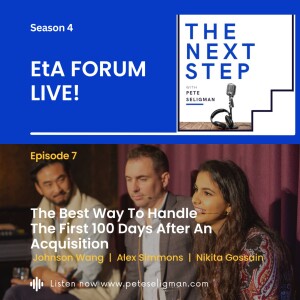
Thursday Mar 02, 2023
Thursday Mar 02, 2023
This panel, as part of the inaugural EtA Forum, takes a close look at how a searcher should approach their first hundred days after closing with a business.
The panelists – Johnson Wang, Alex Simmons and Nikita Gossain – have all had successful searches and are now busy managing their businesses. They share some excellent insights about what they learned, what surprised them, and the mistakes they made along the way. One key theme comes through the panel, and you’ll hear it clearly as you tune in: It’s critical to give yourself time in the new role.
The temptation will be there to rush in, make a big presentation, and get started on making changes immediately, but this would be a mistake. Taking the time to get to know the business and teams, while promoting stability and a “business as usual" approach will allow you to get a better understanding and vision for the business. The panel covers the whole gamut, from how to handle the need to let people go, to sharing responsibilities with your partner in search. There are also some helpful insights on handling change management.
This is because searchers – who often come from private equity or M&A backgrounds, need to quickly transition to their new roles as CEOs and people managers. Naturally, searchers are going to be thinking about what happens when they find that perfect business and close the deal. For those that are doing it for the first time, however, it is a monumental and challenging career step.
Being able to listen to the successes and mistakes that others make is an incredibly valuable resource, and that’s what this panel provides.
Connect with Johnson Wang: https://www.linkedin.com/in/johnsonjwang/
Connect with Alex Simmons: https://www.linkedin.com/in/ansimmons/
Connect with Nikita Gossain: https://au.linkedin.com/in/nikita-gossain
What we discussed:
2:37 Introduction of the panel by the host, Johnson Wang.
7:17 The panel kicks off with a discussion about “day one” of a search journey.
10:30 The discussion now transitions to the first 100 days, and what each person on the panel did to prepare themselves for that first few months.
14:27 Johnson shares the three key priorities that he and his partner had for the first 100 days.
15:49 The next topic for discussion was the role of the new CEO – what their day looks like and what the shift is like from searcher to business manager.
19:06 Johnson asks Nikita to describe her thought processes around the timeline for highly strategic activities (like bringing on a new CEO and communicating her vision for the company to customers and employees).
21:38 With the panel being made up of people with private equity, consulting, M&A backgrounds, the discussion then shifted to the sudden need to manage a company of people, and how an acquirer can approach this challenge.
24:36 The panel starts talking about aversion to change being one of the big challenges they came across early on in the business.
26:10 Letting employees go is one of the more difficult challenges that a new owner faces – the panel discusses the best techniques to handle this.
27:38 The panel now discusses how a partnered search divvies up responsibilities between the new owners.
29:34 The panel shares their most positive and negative surprises of the entire process.
32:49 Q & A with the audience.
44:37 Pete provides a final summary and analysis of the panel discussion.
Key quotes:
Nikita: “I don't think people have massive expectations on day one. They want to get to know you, they want to know that their jobs are not going to get cut immediately, and otherwise there's an open mindedness on day one.”
Alex: “We’ve seen in other examples in search that people come in with a real plan for the things they want to do in the first 90 days. I didn't have any of that, but was very conscious that it was important to invest in understanding the business early and make sure that you understand the people and the relationships. We had some objectives, but nothing like a big PowerPoint of the wonderful things that we wanted to get done.”
Nikita: “You want to get some quick wins in those first 100 days. You want to stabilize, and you want to show them that for the first six months there's no change coming, jobs aren't on the line, and so on.”
Johnson: “It is hard to sit there and try to not make decisions and not act on things. People often will look at you and expect you to act. So it is much harder in practice.”
Nikita: “In terms of strategic thinking, we were claiming that we were one of Australia's most innovative companies. And that was true at a time, but sort of hadn't been for about 10 or 15 years. So there was a need to go back and strategically think about everything, and go through our mission, our vision, our purpose, our goals, our values, and so on. That was actually really well accepted, and the employees took to that.”
Alex: “Culturally, the business had a very passive owner for the last three to five years, and it now had a very active and involved CEO who wanted to take the business to the next stage. So we needed to have the teams start to come on that journey, and some were there, which was great, but others were not yet. So I would spend a lot of time with the teams building projects around growth.”
Nikita: “Having to let someone go is painful, but it’s for the good of the team. It’s unfair to them and to the person that’s not thriving in the environment to keep them on. So it’s something that you’ve just got to do sometimes.”
Alex: “What I didn't appreciate on day zero or minus one was, there's more time for you to get into the role than you think. I probably should have prioritised personal things, like getting comfortable with the rhythm of being CEO, rather than charging in there and trying to get on with everything.”
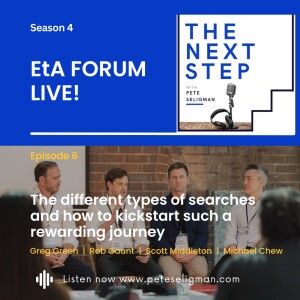
Thursday Feb 23, 2023
Thursday Feb 23, 2023
Anyone that is interested in search and acquisitions needs to tune into this panel. It ran at last year’s inaugural EtA Forum, and brought together four experienced veterans at this fledgling space to talk about how they got started, and what options are available to searchers.
The panel kicks off with a breakdown of the different approaches to search, as well as the benefits of each and what might inspire someone to self-fund a search, or alternatively opt to work with an accelerator or traditional investors.
Critically, it also asks questions that go well beyond the standard “cap raise” challenge. What kind of self-awareness process does a person need to go through to understand that they’re ready for the challenges of a search? How should people go about building up their networks, and then leveraging them once they have them? What is the ideal profile of a searcher, and does this vary by sector?
This panel also prompted some lively Q & A discussion at the end – showing just how insightful prospective searchers and investors found the group. That wide-ranging Q & A covers everything from how a searcher could expect to finance themselves before finding a company to acquire, through to whether it’s better to be “all in'' or instead be a “moonlighting entrepreneur” and conduct the search while still working for a company.
The depth of insights that came out of this panel make it an ideal “beginner’s guide” for anyone who is considering taking up the life search lifestyle for themselves.
Connect with Rob Gaunt: https://au.linkedin.com/in/rob-gaunt
Connect with Greg Green: https://www.linkedin.com/in/greg-green-stc/
Connect with Michael Chu: https://www.linkedin.com/in/michael-chew-3028b61/
Connect with Scott Middleton: https://au.linkedin.com/in/scottmiddleton
What we discussed:
1:39 An introduction to the panel and the panelists.
4:00 The definitions of traditional search vs. self-funded.
5:53 Greg Green explains the appeal of traditional search as an EtA approach.
5:57 Michael Chu explains what attracted him to the self-funded search model.
8:55 The panel addresses how a searcher (especially a self-funded searcher) goes about that first cap raise?
13:34 The panel answers the question that beyond the cap raise, what should searchers be focused on as they commence the search?
17:00 Michael discusses how much self-awareness and preparation he did before deciding to undertake the search.
19:28 Scott Middleton explains the value that an accelerator brings to a searcher.
23:05 Rob Gaunt asks Scott whether being in a non-typical area for search (tech), changes the profile of the searcher they look to work with.
24:12 Rob asks the panel about whether they considered having a partner in their searches, and if not, why not?
26:32 The panel discusses the implications of the economics of search and searcher equity, and whether this had any impact on the type of search they embarked on.
29:43 The panel discusses mistakes and general advice for prospective searchers and/or investors, looking at this opportunity for the first time.
35:34 Rob discusses the importance of time management and the question of how many people you should speak to when searching.
37:48 An extended Q & A with the audience.
54:57 Pete summarises the conversation and provides some analysis.
Quotes:
Greg Green: “If I'm going to surround myself with people to buy a business, I want to know that they've got some commitment to me, because I've already put cash on the table.”
Greg Green: “One of the best things about this model is that it's a stepping stone. So the capital raising initially teaches you how to search, the searching process teaches you a whole lot about running a business.”
Rob Gaunt: “A lot of people focus on the capital raise, which is really pre search, but not a lot of focus, at least in the questions that I get is focused on what happens during the search.”
Michael Chu: “I went and spoke to specific individuals that I thought had the skills and experiences that could help me not make mistakes. I got them on board and started to build a relationship slowly and incrementally so that they could almost form an advisory board for what I'm doing. I do call them my advisers, even though they're probably the people who will end up investing in the deal.”
Michael Chu: “I looked at buying into a business that I would have been a partner with somebody else, and one of the things that It's clear from my experiences that partnerships can be really difficult. There can be different perspectives on the outcomes and the way you go about driving something. It was important to me that it was my show, and I could drive it the way I wanted to.”
Greg Green: “I’ve looked at hundreds of companies, and it has taken me a while to get to the ones that really matter to me. And so I would say that you should talk to your potential investors and ask what matters inside the businesses as they go in. You want to really understand how you should calibrate your thinking around what sort of business you want to own.”
Michael Chu: “As a searcher who wants to become a CEO, I want a cap table that's full of people that I can go to and depend on. When things hit the fan, they’re the ones that I want there in the corner with me dealing with it.”
Scott Middleton: “It can get quite exciting when someone is chatting to you about an interesting opportunity. Then in hindsight you realise that you’ve wasted a lot of time on something that, deep down, you knew was not right, but stuck with anyway.”
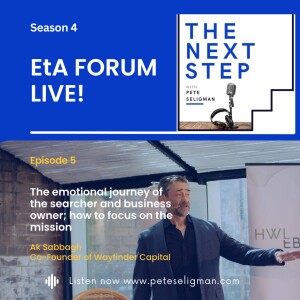
Thursday Feb 16, 2023
Thursday Feb 16, 2023
Akram Sabbagh, the co-founder of Wayfinder Capital and Second Squared, used his presentation at the inaugural EtA Forum to discuss a subject that is often overlooked by searchers and business owners alike: the emotional investment, and how that affects perspective.
There’s an excellent example that Ak gives in his presentation about the different ways a owner might handle a broken printer. When times are good, the company is growing, and the money is rolling in, it’s easy to be blasé about a printer. When the business has hit a plateau and is struggling with the risk of heat death, the frustration the owner feels can result in a very different response.
This is why, as Ak said, a searcher might meet with two different businesses in the same sector and with similar product portfolios, only to experience wildly different atmospheres within the business. This doesn’t necessarily mean that the emotional energy within a business should be the deciding factor in an acquisition. The owner of an organisation that is riding an emotional high will generally have an inflated sense of its value, while a business that has plateaued, is often an opportunity that is simply waiting for new energy and ideas.
What is important is to be able to recognise emotional states and how they can affect perspective, and in his presentation Ak brilliantly runs through the key steps that can help a searcher or business owner stay focused and help the business break through the barriers to achieve advanced growth.
Connect with Pete: https://www.linkedin.com/in/peteseligman/ Connect with Ak: https://www.linkedin.com/in/akram-sabbagh/?originalSubdomain=au
What we discussed:
1:29 Introduction to Akram Sabbagh.
3:51 The journey and history of Wayfinder Capital. 6:45 The idea and goals behind Second Squared, Australia’s first search fund enabler.
10:19 Introducing the idea of “energy”, and the role intangibles, or “vibes” have in a search.
14:02 A breakdown of the emotional journey through a business, from when you’re just starting out, to the point where you see growth and success, and the wall of frustration that you can eventually hit at the other end.
21:11 The different ways that a business owner might respond to a challenge, based on the stage that the business is in.
23:46 What can we do to break through a business that is plateauing out to achieve advanced growth? The personal and professional qualities that every business leader should be developing.
28:46 Q & A and discussion with the audience.
35:00 Pete provides a final summary and analysis of the presentation.
Key Quotes:
“Some of you might have had this weird experience of walking into two almost identical businesses on the same day, similar industries, etc. Yet the energy in one is buzzing and you say to yourself “wow, this is awesome”. You walk into the other one and it's like going into a morgue. They have similar market conditions, similar products, similar everything. But what's different?”
“Succession is something that is really not thought through for a lot of people in the SME space.”
“The Corporate Leadership Council did research several years ago, and noted that emotional engagement is four times more powerful than irrational engagement. So if we can get to the hearts, and the minds of the people we're working with, there’s a four times better rate of connecting with them.”
“Frustration If we don't do something about it leads to stress. As we all know, in this room, stress is not good. Our decision making under stress is never great.”
“I'm assuming that no one in the room wants a business that's just plateauing out, but you'll see some of those and they could be really, really good opportunities to buy. Because they're just sitting there, waiting to be revitalised.”
“When you're feeling frustrated, stressed, disillusioned, and so on, ask how you can reposition yourself? What are you focusing on? What do you need to do to personally refocus and to re engage.”
“Some years ago we did some work with ANZ Bank, and got to understand the economic value of a cup of coffee. When they did the numbers, every cup of coffee worked out to be close to $2 million worth of loan opportunity for them. The lesson here is are you working in relationships? And can you measure them, so that you can see that the first 10 coffees may not go anywhere, but they all may lead me to the 11th. So that $110 on coffee will be well spent.”
“One of the things we look for in searchers is that they don't have all the skills, but they have the self-awareness to know where to find the ones that they don't have.”
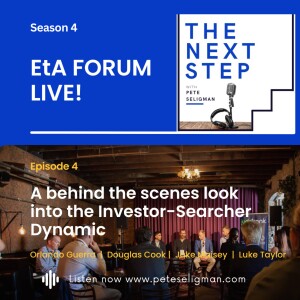
Thursday Feb 09, 2023
Thursday Feb 09, 2023
The first panel at the inaugural EtA Forum provided a lively and hugely interesting discussion, as success stories in both investment and search across Australia and New Zealand came together to share their thoughts on a wide range of topics.
From the appeal of search to investors, through to the relationship that investors and searchers have, this panel is an essential guide to a truly unique relationship in investment. As the panelists agree, one of the most appealing features of being an investor in a search fund is that it’s a rare opportunity for people in private equity to get “hands on.”
Searchers and their investors tend to build a deep relationship, which is based on a mutual exchange of information. Searchers do generally know the things that they don’t know, and investors are able to provide them with the networks and information that allows the acquisition to flourish. It can also help identify poor opportunities more quickly. Here the panel share a story about a search target that ultimately proved to be an option that the searcher didn’t want to follow through with. Thanks to the network that the investor was able to provide, they were able to meet a business leader that had run a similar operation, determined the weaknesses in the business, and was able to exit the opportunity much more quickly than they might have otherwise.
Finally, to round off the panel discussion, the group discussed the role of cap tables and how investors and searches alike can make sure they’re giving every opportunity the look it deserves, leaving nothing on the table. For anyone interested in the sector, this panel was a true behind-the-scenes look at one of the key dynamics and relationships in the whole process.
Connect with Pete: https://www.linkedin.com/in/peteseligman/
Connect with Luke: https://www.linkedin.com/in/luke-taylor11/
Connect with Jack: https://www.linkedin.com/in/jake-maisey-852b3944/
Connect with Doug: https://www.linkedin.com/in/douglas-cook-b5521b/
Connect with Orlando: https://www.linkedin.com/in/orlandoguerra/
What we discussed:
1:28: Introduction to the panelists
6:06: Jack Maisey explains the kind of support that searchers can expect from an organisation like Dorado Capital.
7:20: Doug Cook explains the attraction of the search investment world.
9:51: Orlando Guerra explains the benefits of having a partner in the world of search.
11:44: Jack and Orlando shares a case study to highlight the relationship between investors and searchers, and how they can be mutually beneficial to each other.
14:48: Orlando explains the cap tables and how to structure the research around companies while searching.
17:43: Jack explains the importance of appointing investor directors to the board.
18:23: Doug highlights his views on the role of the investor, transitioning into the operating phase, and the ongoing relationship they should have with the searcher.
21:45: Q & A with the audience.
27:16: Pete provides a summary and final analysis of the panel discussion.
Quotes: Jack Maisey: “We have connections that could help the searcher and provide some more background…. It’s valuable having boots on the ground and actually meeting the owners of those companies.”
Luke Taylor: “I come from an operations and general management background, so didn't come to the table with the same depth of knowledge in the financial modelling space. And so I really linked into the support that my investors provided to iterate myself up to a point where my own financial modelling was able to cut the mustard.”
Doug Cook: “I ask a lot of questions, and through that I learn a lot about the searcher, how they think and operate. Everyone’s go strengths and weaknesses, so what are those, and how can I help balance those things out… and get out of the way when I don’t really need to ask that extra question because they do know what they’re doing.”
Orlando Guerra: “It’s advantageous to have a partner, as that gives you someone to bounce ideas off.”
Luke Taylor: “It’s an almost symbiotic journey, and the relationship between the searcher and investors is really critical.”
Orlando Guerra: “One of the things I learned quite quickly is that there are a lot of things that I don’t really know.”
Orlando Guerra: “It’s much more than money that you’re receiving from investors. It’s really the knowhow and the things that you don’t know that you’re leaning on them for. It was important for us to be able to build that big team that could cover a lot of different things at once.”
Jack Maisey: “The cap table is super important for the investors as well. To be able to look at the cap table and see that the searchers actually have the people around them that can support them.”
Jack Maisey: “That’s one of the great things about searches. We’re all in it together.”
Doug Cook: “There are times where I would talk to the searcher every month, and then other times where we didn’t talk for eight, nine months at a time, because he didn’t have a need for my skillset. I’m happy to be involved and I like to have good visibility into what’s going on, but it’s the searcher that’s actually in the business and running it.

